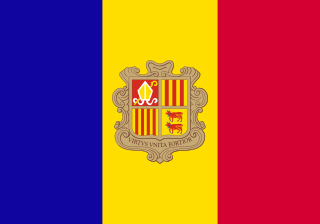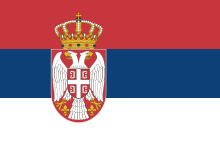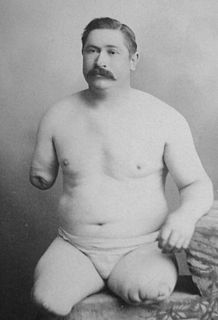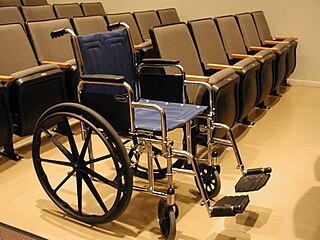
Australia competed at the 1992 Winter Paralympics in Tignes and Albertville in France. They were the first winter Paralympics to be celebrated concurrently with the Olympic Games. The official logo of the Games was designed by Jean-Michel Folon.It depicts a bird with broken wings, soaring high across the peak of a mountain. This was used to reflect the sporting abilities of the athletes at the Games. The official mascot, Alpy, designed by Vincent Thiebaut, represented the summit of the Grande Motte mountain in Tignes. Alpy was shown on a mono-ski to demonstrate its athleticism and the colours of white, green and blue were used to represent purity/snow, hope/nature and discipline/the lake. The 1992 Games were where Australia won their first winter medals at the Paralympics. Michael Milton won Australia's first gold with a win in the Men's Slalom LW2. Milton also won a silver medal in the Men's Super G LW2. At these Games, Australia was represented by 5 male athletes. Australia was placed 12th in the overall medal tally for the Winter Games winning a total of 4 medals: 1 gold, 1 silver and 2 bronze.

Brazil sent a delegation to compete at the 2014 Winter Paralympics in Sochi, Russia, held between 7–16 March 2014. This marked the country's first entry into the Winter Paralympic Games. Brazil sent two athletes, snowboarder Andre Pereira in Alpine skiing and Fernando Rocha in cross-country skiing. The country's best performance in any event was 15th, achieved by Rocha in the 15 km sitting competition.

Andorra sent a delegation to compete at the 2014 Winter Paralympics in Sochi, Russia, held between 7–16 March 2014. This marked the nation's fourth participation in a Winter Paralympics The delegation consisted of a single athlete, alpine skier Xavier Fernandez, who failed to post a finishing time in either of the two events he competed in.

Chile sent a delegation to compete at the 2014 Winter Paralympics in Sochi, Russia from 7–16 March 2014. This was Chile's fourth participation in a Winter Paralympic Games. The Chilean delegation consisted of two alpine skiers, Jorge Migueles and Santiago Vega. Migueles finished 25th in the men's standing slalom and 20th in the men's standing giant slalom, while Vega finished 32nd in the regular slalom.

Mexico competed at the 2014 Winter Paralympics in Sochi, Russia, held between 7–16 March 2014. This was Mexico's third appearance at a Winter Paralympic Games. They were represented by a single athlete, alpine skier Arly Velásquez, who was participating in his second Paralympics. His best finish was 11th place in the sitting super-G.

Iran sent a delegation to compete at the 2014 Winter Paralympics in Sochi, Russia from 7–16 March 2014. This was Iran's fifth time participating in a Winter Paralympic Games. The Iranian delegation consisted of a single alpine skier, Sadegh Kalhor, who had his leg amputated in a skiing accident as a teenager. In the standing slalom event, he finished in 20th place.

Mongolia sent a delegation to compete at the 2014 Winter Paralympics in Sochi, Russia, from 7–16 March 2014. This was Mongolia's third time participating in a Winter Paralympic Games. The delegation consisted of a single cross-country skier, Batmönkhiin Ganbold. His best performance in any event was 14th in the men's standing 20 kilometer freestyle, he finished 31st in the 10 km event, and did not advance from the qualification round of the 1 km sprint.

Uzbekistan sent a delegation to compete at the 2014 Winter Paralympics in Sochi, Russia, held between 7–16 March 2014. This marked the first time the nation competed at the Winter Paralympics. The delegation consisted of two athletes, Yevgeniy Slepov and Ramil Gayazov, both were competitors in Alpine skiing. Gayazov failed to post an event finish, while Slepov finished 32nd in the snowboard cross.

Armenia sent a delegation to compete at the 2014 Winter Paralympics in Sochi, Russia from 7–16 March 2014. This was the nation's fifth appearance at a Winter Paralympic Games. The delegation consisted of a single alpine skier, Mher Avanesyan, who lost both arms as a child after coming into contact with a high-voltage electrical wire. In the men's standing slalom he came in 34th place out of 35 competitors who finished the race, and he failed to finish the giant slalom.

Belgium sent a delegation to compete at the 2014 Winter Paralympics in Sochi, Russia, held between 7–16 March 2014. This was Belgium's eighth time participating in the Winter Paralympic Games. The Belgian delegation consisted of two athletes, Jasper Balcaen in alpine skiing, and Denis Colle, a snowboarder, which was considered a discipline of alpine skiing for these Paralympics. Their best performance in any event was 6th by Colle in the snowboard cross.

Bosnia and Herzegovina sent a delegation to compete at the 2014 Winter Paralympics in Sochi, Russia from 7–16 March 2014. This was the second time the country had participated in a Winter Paralympic Games. The delegation consisted of two alpine skiers, Senad Turkovic and Ilma Kazazic. Neither of the two finished any of their events.

Denmark sent a delegation to compete at the 2014 Winter Paralympics in Sochi, Russia from 7–16 March 2014. This was Denmark's tenth appearance at a Winter Paralympic Games. The Danish delegation to Sochi consisted of two alpine skiers, Ulrik Nyvold and Line Damgaard. Nyvold failed to finish either of his events, while Damgaard placed 12th in the women's standing slalom and 15th in the women's standing giant slalom.

Greece sent a delegation to compete at the 2014 Winter Paralympics in Sochi, Russia from 7–16 March 2014. This was Greece's third appearance at a Winter Paralympic Games. Their only athlete was alpine skier Efthymios Kalaras. He suffered a spinal cord injury two decades before these Paralympics, and was a returning Paralympic silver medalist from the 2004 Summer Paralympics in the discus throw. He finished 22nd in the sitting giant slalom, nearly a minute behind the gold medal time.

Iceland sent a delegation to compete at the 2014 Winter Paralympics in Sochi, Russia from 7–16 March 2014. This was Iceland's third time participating at a Winter Paralympic Games. The Icelandic delegation consisted of two alpine skiers, Erna Friðriksdóttir and Jóhann Þór Hólmgrímsson. Jóhann finished 23rd in the men's sitting giant slalom, while Erna finished 10th in the women's sitting slalom and 9th in the women's sitting giant slalom.

Romania competed at the 2014 Winter Paralympics in Sochi, Russia, held between 7–16 March 2014. This was Romania's second appearance at a Winter Paralympic Games. The Romanian delegation consisted of one alpine skier, Laura Valeanu, who finished fifth in the slalom and seventh in the giant slalom.

Slovenia sent a delegation to compete at the 2014 Winter Paralympics in Sochi, Russia, held between 7–16 March 2014. This was the nation's fourth appearance in the Winter Paralympic Games The Slovenian delegation consisted of a single athlete, the alpine skier Gal Jakic, who failed to finish either of his two events.

Turkey sent a delegation to compete at the 2014 Winter Paralympics in Sochi, Russia, held between 7–16 March 2014. This marked the nation's first participation in the Winter Paralympic Games. Turkey sent two athletes; Mehmet Çekiç and Hilmi Esat Bayindirli; both were competitors in alpine skiing. The nation's best finish in any event was 18th, by Bayindirli in the men's sitting giant slalom.

New Zealand sent a delegation to compete at the 2014 Winter Paralympics in Sochi, Russia, held between 7–16 March 2014. The country continued its streak of competing in every Winter Paralympics since 1984. New Zealand's delegation consisted of three competitors in alpine skiing, one of whom, Corey Peters, won a silver medal in the giant slalom. With one silver medal, the country tied for 16th on the medal table for these Paralympics.

Alexey Sergeyevich Bugaev is a Russian para-alpine skier who competed at the 2014 Winter Paralympics, winning five medals.

The Netherlands sent a delegation to compete at the 2014 Winter Paralympics in Sochi, Russia, held between 7–16 March 2014. The Netherlands delegation consisted of seven competitors, all of which were competing in sports under the alpine skiing banner. Bibian Mentel won the nation's only medal at these Paralympics, a gold in women's snowboard cross. With one gold medal, the Netherlands ranked a joint 14th place on the medal table with Switzerland.





























